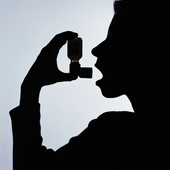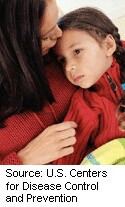| 
Severe Asthma Unlike Mild Asthma

THURSDAY, Jan. 31 (HealthDay News) -- Researchers report there are important differences between people with severe and non-severe asthma, something that could help explain why those with severe asthma don't respond well to treatment.
The study, from the Severe Asthma Research Program (SARP), looked at 287 people with severe asthma and 382 people with mild or moderate asthma. It found that people with severe asthma are more likely to show signs of "air trapping" in the lungs, a condition that prevents full exhalation. In addition, those with severe asthma are more likely to have airway obstruction even after maximal treatment. These findings suggest that severe asthma may be a different form of the disease, the researchers said.
"This tells us that something entirely different is going on in people classified as having severe asthma, either physiologically or in the airways that are affected," study author Ronald Sorkness, a physiologist at the University of Wisconsin in Madison, said in a prepared statement.
The findings were published online in the Journal of Applied Physiology.
About 90 percent to 95 percent of asthma cases can be controlled with medication, but 5 percent to 10 percent of people have a severe form of asthma that doesn't respond well to treatment. People with severe asthma are likely to have more attacks and are at increased risk for a fatal attack. Each year, asthma causes about 4,200 deaths in the United States.
SARP was formed to learn more about severe asthma and improve treatment of the condition.
More information
The U.S. Centers for Disease Control and Prevention has more about asthma.
|  |

Study Links Snoring to Chronic Bronchitis
 MONDAY, Jan. 28 (HealthDay News) -- A large South Korean study found frequent snoring was associated with the development of chronic bronchitis, but the researchers themselves said they aren't sure why.
"The mechanisms underlying the association between snoring and chronic bronchitis are largely unknown," said the report, published in the Jan. 28 issue of Archives of Internal Medicine, that was conducted by researchers at Korea University Ansan Hospital, in Ansan.
Bronchitis is inflammation of the air passages within the lungs. Acute bronchitis is often caused by an infection and goes away after treatment or on its own. Chronic bronchitis is most often caused by smoking or exposure to lung-irritating substances such as chemical fumes or dust, and does not go away quickly.
The Korean study of 4,270 individuals found that those who said they snored six to seven nights a week were 68 percent more likely to develop chronic bronchitis than those who said they never snored. The incidence of chronic bronchitis was 25 percent greater for people who snored five times a week or less.
Dr. Robert Keeton, a research fellow at the University of Michigan Sleep Disorders Center, called the findings an interesting association, "but you can't say it's conclusive. It can't be something you can cite to tell patients in the clinic that they have chronic bronchitis because they snore."
The Korean study proposed two possible reasons for the association. One is that the vibrations caused by snoring lead to inflammation in the airways. The other is that the inflammation comes first, causing the snoring and possibly sleep apnea, in which breathing stops or becomes very shallow periodically for 10 or 20 seconds.
"It's not unusual for people with obstructive sleep apnea to have such symptoms," Keeton said. "A common cause of snoring is obstructive sleep apnea."
Sleep apnea causes a distinctive kind of snoring, a loud gasping every time the airways are obstructed. Obese people are more likely to experience sleep apnea, but it can occur in persons of normal weight.
The incidence of sleep apnea is an unanswered question in the Korean study, said Dr. Charles Bae, a neurologist at the Cleveland Clinic Sleep Disorders Center. All the information in the study was based on reports by the participants, Bae noted, and there does not seem to have been an attempt by the researchers to determine how many of the patients may have had sleep apnea.
"There is certainly a relationship between sleep apnea and increased inflammation in the body," he said.
The bottom line, Bae said, is that the Korean paper "points out an interesting relationship that needs further research."
More information
You can learn more about bronchitis at the U.S. National Library of Medicine.
|  |

Saline Nasal Wash Helps Kids Fight Colds, Flu
 MONDAY, Jan. 21 (HealthDay News) -- Rinsing with a special saline nasal wash made from Atlantic seawater improves symptoms in children with colds and flu, and may prevent recurrence of these infections, a new study claims.
"We brush our teeth every day, however, we do not pay attention to our noses -- a potential gate for infection," said study co-author Dr. Jana Skoupa, of Pharma Projects in Prague, Czech Republic. "Nasal wash should be used, based on our findings, immediately."
The study seems to confirm what many doctors already know.
"We have recommended this for years. This study gives some objective evidence," said Dr. Jonathan Field, emeritus director of the pediatric allergy and asthma clinic at New York University/Bellevue Medical Center in New York City.
An alternative to the many cough and cold medications that line drugstore shelves comes not a moment too soon.
Just last week, the U.S. Food and Drug Administration issued an advisory stating that over-the-counter cough and cold medicines should not be given to infants and children under the age of 2. The agency has not come to a final decision on the use of such products in children aged 2 to 11.
"This is very promising, but there need to be more studies to confirm what the authors have found," Dr. Tom DeWitt, director of general pediatrics at Cincinnati Children's Hospital Medical Center. "It is a suggestion that it may be an alternative to cold preparations that the FDA [recently issued a public health advisory about]."
The saline technique could provide a more holistic alternative to such over-the-counter medications, and has the added advantage of having little downside and not contributing to the growing problem of antibiotic resistance.
The study, published in the January issue of the Archives of Otolaryngology-Head & Neck Surgery, involved about 400 children aged 6 to 10 with colds or the flu. The children were randomly assigned to receive either standard medication plus the nasal wash, or standard medication alone.
The nasal wash formula was given six times a day for eight weeks, then three times a day for the next four weeks.
By the second visit, patients receiving the nasal wash had less stuffy and runny noses. By eight weeks, those in this group had less severe sore throats, coughs, nasal obstructions and secretions.
Also, after week eight, only 9 percent of children in the saline group were using fever-reducing drugs, compared with 33 percent in the control group; only 5 percent were using decongestants, versus 47 percent in the control group; and only 6 percent of saline recipients were using antibiotics, compared with 21 percent in the control group. Children using the nasal wash also had shorter illnesses and fewer missed school days.
Compliance, however, may become an issue outside the context of a clinical study. "They did it six times a day," DeWitt pointed out. "How many parents are going to do that six times a day?"
The trial was funded by French company Goemar Laboratoires, which makes the product, Physiomer, that used in the study.
"As far as I know, Physiomer is not available in the U.S. It is the leading brand in Europe," Skoupa said. "The manufacturing process uses electro-dialysis (not simple dilution of seawater) to achieve isotonicity. This results in preserving the majority of minerals and trace elements in similar concentrations to seawater from the Atlantic Ocean."
An isotonic solution has the same concentration of salt as the human body.
"I would not just simply expect a normal saline solution to be the same thing," DeWitt said.
More information
The Medical College of Wisconsin  has more on respiratory infections in children. has more on respiratory infections in children.
|  |
|